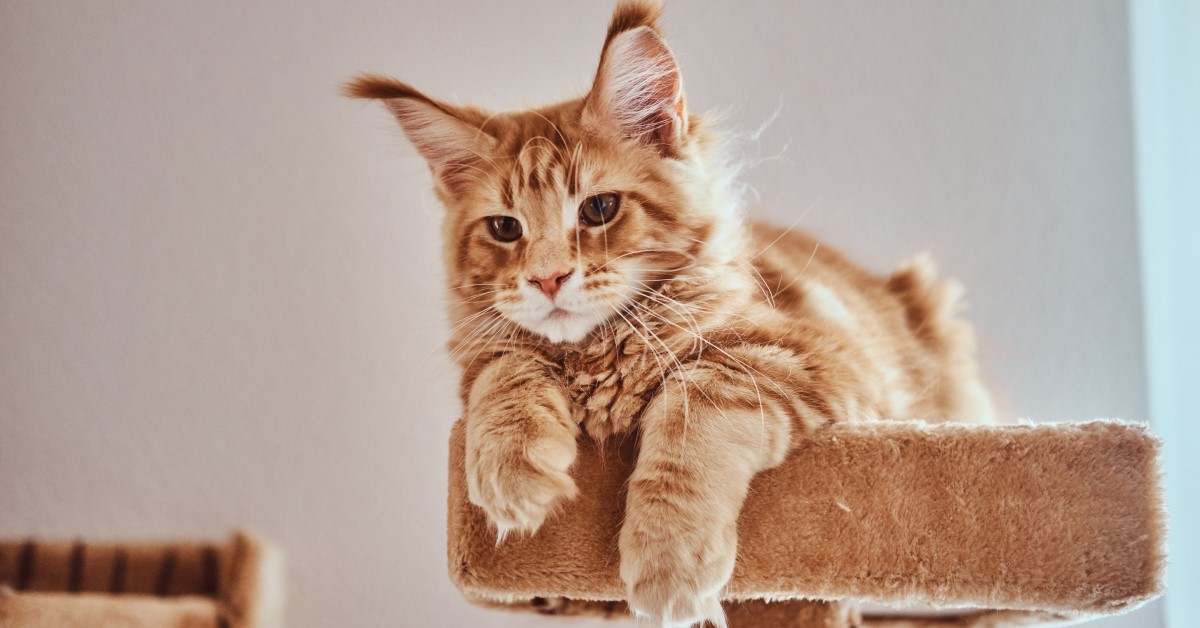Getting to Know the Maine Coon
Get the facts on the Maine Coon, from personality traits to common health concerns.

If you love big dogs, you might adopt a Great Dane; if you love big cats, you'll want to make a Maine Coon part of your household. This large, beautiful, athletic cat sports an impressive coat, a friendly personality, and a high degree of intelligence. As with other breeds, however, the Maine Coon has some specific needs and faces certain feline health risks. This introduction to the breed should help you keep your new friend happy and healthy.
The Big Picture About a Big Kitty
The Maine Coon, named after its supposed state of origin (although it may actually have originated across the Atlantic), enjoys a reputation as the largest of all domestic cats. Males can grow up to 40 inches in length and weigh up to 25 pounds without reaching obesity. Females can achieve the same length, but their normal weight approaches "only" 15 pounds. Even a kitten can easily weigh five pounds and be as large as adult cats of other breeds.
The coat of a typical Maine Coon makes this cat look even bigger than it really is. The breed features long, thick, shaggy hair that lends it a regal, dignified quality. The tufts of hair inside this cat's ears count as another distinctive feature.
The Maine Coon boasts an equally outsized personality as well. Maine Coons love to talk to their owners, generally in soft tones, while constantly following them around and seeking affection. They display a relaxed overall temperament as well as a keen intelligence that enables them to learn rapidly and even do tricks. Maine Coons can feel equally comfortable indoors or out.
What (and How Much) Should a Maine Coon Eat?
Like other cats, Maine Coons are carnivores that rely on meat for their daily nutrition. Your Maine Coon will probably be happy to eat a diet of prepared cat food, fish, or chicken. If you choose a prepared product, go for wet food instead of kibble. In the wild, cats get the water they need from prey, so they don't have much desire to drink water - making the water in wet food a critical source of hydration.
If you think a cat the size of a Maine Coon naturally eats a lot, you're correct. These animals aren't just large; they're also highly active and athletic, which means they burn a lot of calories. When feeding a Maine Coon, assume that your furball needs 20 calories for each pound of healthy weight you'd like it to maintain.
Grooming a Maine Coon
Maine Coons are just as fastidious in their self-grooming efforts as other cats. On the positive side, this attention to hygiene frees you from the need to bathe your cat frequently. On the negative side, that thick coat provides plenty of hair for your cat to ingest, forming hairballs that could create intestinal issues if you let that coat go unchecked.
Regular brushing can reduce hairball formation, result in less hair on your carpets and upholstery, and keep your Maine Coon looking beautiful. It also gives the two of you some precious bonding time, since Maine Coons love tactile affection from their owners. But if you brush your cat's coat every day, make sure to use a blunt-tipped brush that won't damage or irritate the skin.
Dental hygiene can also help maintain your Maine Coon's health. Using a pet-friendly toothpaste, brush your cat's teeth a few times a week if possible.
Common Maine Coon Health Disorders
Maine Coons are vulnerable to many of the same health risks that other cats must confront. Obesity can prove a major problem, partly because Maine Coons eat so much under normal circumstances and partly because you may find it hard to tell how much of that extra bulk is tummy and how much is hair. Obesity can contribute to the development of diabetes, another serious feline health disorder, while poor diet can promote dental diseases.
Inherited health conditions can plague some Maine Coons. Examples of such conditions include:
- Polycystic kidney disease - The formation of cysts can eventually cause kidney failure, with symptoms becoming visible at around age seven.
- Stomatitis - Stomatitis is a painful inflammation of the oral tissues that can make chewing difficult or impossible.
- Hip dysplasia - Hip dysplasia, a hereditary malformation of the hip joint, can affect Maine Coons just as it often strikes certain large dog breeds.
- Hypertrophic cardiomyopathy - Thickening of the heart wall can interfere with the normal pumping of blood or even cause a heart attack.
- Spinal muscular atrophy - In this neurological condition, a Maine Coon's limbs may grow weak and lose function.
Introduce Your Maine Coon to Your Vet
To give your Maine Coon the healthiest life possible, get to know a reputable veterinarian and schedule periodic wellness exams. The vet can weigh your big kitty to determine whether it suffers from obesity, and recommend dietary or lifestyle changes to correct the problem before complications set in. They can also recommend and perform treatment for a wide range of diseases and disorders. Last but not least, your cat can receive those all-important parasite prevention drugs and essential vaccinations.
Address the points noted above, and you'll find yourself more than ready to accommodate that massive new Maine Coon in your life. Best of luck to both of you!
Ready to start saving money on pet wellness care?
Then take a look at Mint Wellness, the pet wellness plan that provides fast reimbursement on routine pet care. Save on vaccinations, wellness exams, preventatives, dental, and more!
Learn More


